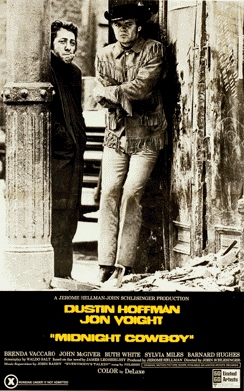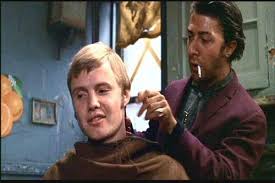
An iconic scene makes for an iconic poster
“Now I want you to remember that no bastard ever won a war by dying for his country. He won it by making the other poor dumb bastard die for his country.” – General George Patton (George C. Scott), motivational guru, Patton
Following the low budget Midnight Cowboy, the Academy returned to appreciating grand epics with the 1970 Best Picture, Patton. Based on the real-life, hard-nosed World War II General George Patton, the movie boasts some of the most realistic large-scale military battles filmed to up to that point. Patton also had a tremendous performance by George C. Scott who brought depth to a virtual cartoon character with enough ego to make him nearly unlikeable. The 1970s Best Pictures tend to favor men of low character or in a low social status but Patton bucks that trend by following a genuine war hero, although one with an ego as big as a tank.

Another moment from Patton’s amazing opening speech, a sanitized version of his speech to the third infantry before the Battle of the Bulge
Patton starts in 1943 with the U.S. suffering a crushing defeat in Tunisia (which the film chalks up to poor British leadership). General George Patton, brash, outspoken, eccentric and strict is called to lead the tank squadron and restore US victory. Patton immediately clashes with the British, in particular the egotistical General Montgomery who is the leader of the African campaign. Patton is exceedingly old-fashioned and views war as the ultimate test of manhood and his path to a great destiny. He is enraged by the political games played between the US and England as they fight the Germans. He and Montgomery clash over their respective plans to take the Italian island of Sicily, with Montgomery’s plan ultimately being chosen, although it falters for exactly the reason Patton predicts. Patton leaves his second in command, the humble General Omar Bradley (Karl Malden), to face heavy fire while he races around the island in order to beat Montgomery in capturing a strategically significant town. Along the way, he creates a public relations nightmare by berating and smacking a shell-shocked soldier (not to mention endangering lives by pushing his men into unfavorable battle positions). Patton is sidelined because of the incident but given a second chance by Bradley, who has been promoted above him, to lead a tank squadron into Germany.

Patton’s lack of sympathy for men scared in the face of conflict is one of the way’s the movie tries to show him in a less than sympathetic life. This really happened, by the way.
I was slow to warm up to Patton, as I thought the movie started very slow and clunky, but finally picked up pace about thirty minutes in. Patton’s strange antics, from quoting history and poems and espousing his belief in reincarnation, not to mention his outsized ego, are so bizarre that they take a while to sink in. The movie sticks with this characterization throughout to the point we as the audience accept it as Patton’s nature.
The very beginning of the movie is Patton’s best and most famous scene, with Scott giving a long motivational speech to the troops behind a gigantic American flag. It’s a great scene that won Scott his Oscar for Best actor, with about one hundred memorable quotes. The movie’s biggest flaw is that it tries too hard to tell us how great Patton really is. In fact, the movie repeatedly cuts away to German headquarters where German generals heap praises on the man and openly predict on how Patton’s next move will spell certain destruction for them.

Just so we don’t look at George C. Scott the whole time, here’s Patton’s one-time friend, turned commander, General Omar Bradley, portrayed by Karl Malden.
Patton is very similar to the 1962 Best Picture, Lawrence of Arabia. Both feature eccentric but brilliant men who thrive in unorthodox but ultimately successful methods to wage war but are ultimately undone by their own arrogance and inability to function within the political regime controlling the war effort. It’s interesting that a movie that popularizes a war general would fare so well in the anti-war climate of 1970. Francis Ford Coppola said in the introduction to the film included on the DVD that as co-writer, he strove to include both criticism and praise of Patton in the film, which likely balanced out some negative reaction to it. Patton also stands out as an anti-authority outsider, which likely held appeal to the counter-culture. The true villain of the film is the political machine that constantly fouls up Patton’s plans and stops his dreams of glory and victory. The same authority, a contemporary viewer might say, is who had involved US in the quagmire of Vietnam and was trying to stamp out his or her own individuality. It is also likely the film appealed to older voting members of the Academy who viewed the heights of World War II with a renewed appreciation in contrast to the floundering Vietnam War effort and were more likely to go with a conservative choice following the victory of the very liberal Midnight Cowboy the previous year.
As noted George C. Scott was given the Best Actor Oscar but became the first person in history to decline the award, citing his disdain for the awards process and claiming that acting was not a competition. Scott’s decline of the award would be overshadowed by a far more spectacular rejection of the acting trophy a mere two years later.
Other Oscars: Best Director (Franklin J. Schaffner ); Best Actor (George C Scott)(declined); Best Original Screenplay; Best Film Editing; Best Sound; Best Art Direction
Box Office: $61.7 Million (4th for the year)
Other Notable films of 1970: MASH*; Love Story*$; Five Easy Pieces*; Woodstock; The Aristocats; Little Big Man; Airport*; Beneath the Planet of the Apes; Beyond the Valley of the Dolls; The Great White Hope;
*Best Picture Nominee
$Top Box Office Draw: $106.4 Million


